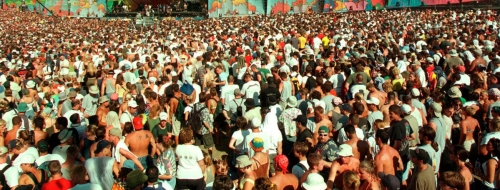This was Woodstock. As Jeffrey Tucker reminds us, Woodstock took place in the midst of a global pandemic that claimed more American lives than has Covid-19 (at least so far) — at a time when the population was much smaller . After correcting for population size and demographics, Tucker estimates the Hong Kong flu epidemic of 1969 killed the equivalent of 250,000 contemporary Americans, compared to under 100,000 so far for the current affliction.
Yet in 1969, American life went on pretty much as normal. As Tucker points out:
Stock markets didn’t crash because of the flu. Congress passed no legislation. The Federal Reserve did nothing. Not a single governor acted to enforce social distancing, curve flattening (even though hundreds of thousands of people were hospitalized), or banning of crowds. No mothers were arrested for taking their kids to other homes. No surfers were arrested. No daycares were shut even though there were more infant deaths with this virus than the one we are experiencing now. There were no suicides, no unemployment, no drug overdoses attributable to flu.
Media covered the pandemic but it never became a big issue.
The Woodstock producers flew in a dozen doctors to have on hand in case of a fast-spreading virus, but they seem to have given no serious thought to the prospect of cancelling.
Why such a difference between then and now? Tucker suggests a few possible culprits (the 24 hour news cycle, political and cultural shifts, etc.), but the first thing that came to my mind was that folks today are a whole lot richer than folks in 1969, and can therefore much better afford to take a few months off. If the average worker in 1969 had taken a four-month unscheduled vacation without any assistance, he’d have gone hungry — and the amount of available assistance was limited by the fact that everyone else was a lot poorer then too.
Here are the key facts we need to test that theory:
- The income of the average American today is about two-and-a-half times what it was in 1969.
- The income elasticity of the value of life is estimated to be somewhere between .5 and 1.0, and probably toward the lower end of that range for a developed country like the United States. I’ll take it to be .6. Here the “value of life” refers to the amount people are willing to pay to avoid a given small chance of death, and the elasticity estimate means that the value of your life is (approximately) proportional to I.6, where I is your income.
Taken together, these facts imply that the value of a life in 1969 was about 58% of what it is today, which in turn implies that people would have been willing to put up with only 58% as much lost income in exchange for the same amount of safety. If you’re willing to tolerate six months without a paycheck to avoid, say, a 1% chance of death, then your 1969 self would have been willing to tolerate only about three-and-a-half months. If avoiding that 1% chance of death requires, say, a five-month lockdown (or any other length longer than three-and-a-half months but shorter than six), then you’re going to favor that lockdown, though you’d have scoffed at the thought of it in 1969.
Even this fails to account for another factor: A national shutdown of a given length would have been a lot costlier in 1969 than it is in 2020, when a good 30% of us can work from home. Perhaps a six-month lockdown only costs us (on average), say, three month’s income. (I pulled that “three months” out of my hat. I’m sure with a little research I could have done better.) If that’s what we’re willing to tolerate for a given amount of safety, then our 1969 selves would have tolerated only a one-and-three-quarter months’s income loss, which might have meant something like a two month lockdown. Where we’d tolerate six months, they’d tolerate only two.
In other words: Nobody considered locking down the economy in 1969 because they couldn’t afford to (or more precisely, given their relative poverty, they preferred to spend their wealth on other things). Today’s lockdown is widely supported because it’s a luxury we’ve grown rich enough to afford. In other words, the lockdown is yet another triumph of capitalism.
That, at least, is what the back of my envelope says. I expect there are people who have thought about this a whole lot harder than I have. I hope we hear from some of them.


